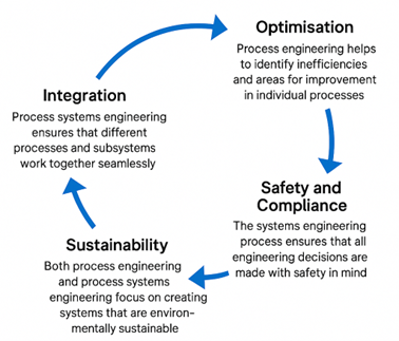Article contents
UNDERSTANDING WHAT IS PROCESS ENGINEERING AND HOW IT CONTRIBUTES TO EFFICIENT SYSTEM DESIGN
Key Insights:
- Process engineering focuses on designing, optimising, and improving industrial processes to enhance efficiency and sustainability.
- Process systems engineering integrates various subsystems to create an efficient and scalable global solutions.
- The systems engineering process applies a holistic approach to design, development, and operational optimisation.
- RED Engineering applies process engineering across sectors like energy, manufacturing, and pharmaceuticals to improve operational efficiency, reduce waste, and ensure compliance with safety standards.
What exactly is process engineering, and how does it play a pivotal role in creating more efficient and sustainable systems? Across all the world and industries, ensuring that processes run smoothly, safely, and sustainably is critical. This is where process engineering steps in, helping to design, optimise, and improve the intricate systems that power industries like such as energy, manufacturing, and pharmaceuticals.
But process engineering is just the beginning. By integrating process systems engineering and the systems engineering process, engineers can take a holistic approach to system design, focusing on individual components and how they work together for maximum efficiency.
In this article, we’ll break down the essentials of these engineering disciplines and show how they combine to drive innovation, improve safety, reduce costs, and ensure operational excellence across sectors. Whether you’re new to the field or looking to enhance your knowledge, this guide will provide valuable insights into the role of process engineering in modern industry.
What is process engineering?
At its core, process engineering is the discipline that focuses on designing, optimising, and improving industrial processes. It involves understanding the chemical, physical, and mechanical processes that occur in production and finding ways to make them more efficient. Process engineers are responsible for ensuring that these processes operate smoothly, sustainably, and above all, safely.
Process engineers also consider factors like cost and energy usage, as well as the environmental impact when designing systems. By improving the overall flow of materials, energy, and data, they help organisations reduce waste and improve quality ensuring the longevity of the process.
For example, in pharmaceutical manufacturing, process engineering ensures that raw materials are efficiently converted into final products. Engineers apply methods to optimise the production process, ensure product consistency, and reduce the environmental footprint, all while maintaining safety standards.
What is process systems engineering? (and the difference between process engineering)
Process systems engineering is an extension of process engineering. While process engineering focuses on individual processes, process systems engineering takes a broader approach. It involves the integration of multiple processes, subsystems, and technologies to create a cohesive and optimised system. The goal is to design and optimise the entire system, ensuring that all parts work together efficiently and cost-effectively.
Process systems engineers consider the overall life cycle of the system, from conception through to operation and decommissioning. They use advanced modelling, simulation, and optimisation tools to design systems that are both scalable and resilient.
For example, in energy production, process systems engineering ensures that power generation, transmission, and distribution systems work together seamlessly. Engineers integrate various subsystems such as turbines, boilers, and electrical grids to create an efficient and reliable system that meets both performance and regulatory requirements.
What is the systems engineering process?
The systems engineering process is a structured approach to designing and optimising complex systems. It involves defining system requirements, developing and testing prototypes, and continually improving system performance throughout its life cycle.
This approach is holistic, meaning it takes into account all aspects of the system, including engineering, user needs, performance metrics, and potential risks. The systems engineering process is used across many industries, from aerospace to manufacturing, and is essential for ensuring that systems are efficient, cost-effective, and safe.
Steps in the systems engineering process
Requirements analysis
System design
Prototyping and testing
Implementation and operation
Continuous improvement
How process engineering contributes to efficient system design
Process engineering, process systems engineering, and the systems engineering process work together to design efficient, sustainable, and safe systems.
Here's how they do this:
- Optimisation
- Safety and Compliance
- Sustainability
- Integration

RED Engineering’s approach to process engineering
At RED Engineering, we integrate process engineering, process systems engineering, and the systems engineering process to deliver efficient, sustainable, and safe solutions across various sectors. Here’s how our Process Engineering Consultants support our clients:
1. Tailored process design
We work closely with our clients to develop process designs that meet their unique needs, ensuring efficiency, safety, and regulatory compliance.
2. Optimisation and sustainability
Our team uses advanced modelling and optimisation techniques to enhance the performance of industrial systems while minimising waste and energy consumption.
3. Multidisciplinary collaboration
RED Engineering’s experts collaborate across disciplines to design and implement systems that meet performance, safety, and regulatory requirements. We integrate process, systems, and safety engineering to create cohesive solutions.
Ready to improve your system design?
At RED Engineering, we are committed to helping clients optimise their systems and achieve efficiency through expert process engineering. Get in touch with us today to learn how we can support your project and improve your system design.
Join Team RED
Join our award-winning team! We’re seeking talented individuals across all regions and experience levels. Explore exciting opportunities to make a difference today!
Find out more